英语易混词语辨析
高考翻译易混淆词辨析

高考翻译易混淆词辨析导语:高考英语翻译常常是考生们心中的痛。
尤其是在词义辨析上,很多同学常常被类似或者相似的单词搞得一头雾水。
为了帮助大家更好地应对高考翻译题,本文将为大家介绍一些易混淆词的辨析,希望能够帮助大家提高翻译能力,取得更好的成绩。
一、常见易混淆词辨析:1. Immigrate与EmigrateImmigrate和Emigrate都表示“移民”的意思,但是它们的使用情境略有不同。
Immigrate多指从一个国家移居到另一个国家,强调的是移动的目的地。
Emigrate多指离开一个国家,强调的是移动的出发地。
例如:His parents immigrated to Canada last year. (他的父母去年移民到加拿大。
)My grandparents emigrated from China when they were young. (我祖父母在年轻时从中国移民出去。
)2. Adverse与AverseAdverse和Averse都表示“反对”的意思,但是它们的用法稍有区别。
Adverse通常用来形容事物和不利的环境,而Averse则用于描述人的态度或意愿。
Adverse在句子中通常是形容词,而Averse通常是形容词或者介词。
例如:She had an adverse reaction to the medication. (她对药物有不良反应。
)I am averse to taking risks. (我不愿意冒险。
)3. Assure、Ensure与InsureAssure、Ensure和Insure都表示“确保”的意思,但是它们的用法略有不同。
Assure常常用来表示向人提供保证或安抚情绪,ensure表示确保某事发生或做好准备,而insure则用于表示购买保险。
例如:I assure you that everything will be fine. (我向你保证一切都会好起来的。
高考高中英语易混淆50组重点词语分类辨析+例句汇总
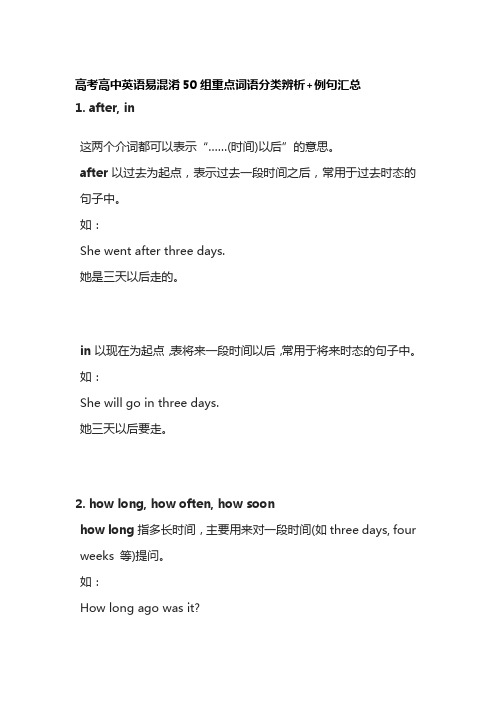
高考高中英语易混淆50组重点词语分类辨析+例句汇总1. after, in这两个介词都可以表示“……(时间)以后”的意思。
after以过去为起点,表示过去一段时间之后,常用于过去时态的句子中。
如:She went after three days.她是三天以后走的。
in以现在为起点,表将来一段时间以后,常用于将来时态的句子中。
如:She will go in three days.她三天以后要走。
2. how long, how often, how soonhow long指多长时间,主要用来对一段时间(如three days, four weeks 等)提问。
如:How long ago was it?这是多久前的事了?how often指每隔多久,主要用来对频率副词或状语(如once a week等)提问。
如:—How often does he come here? —Once a month.他(每隔)多久来一次?每月一次?how soon指再过多久,主要用来对表示将来的一段时间(in an hour, in two weeks 等)提问。
如:How soon can you come?你多快能赶来?3. few, a few, little, a little, several, somefew 和little的意思是否定的,表示“很少”或“几乎没有”;而a few和a little的意思是肯定的,表示“有一些,有一点儿”。
few 和a few修饰可数名词;little 和a little 修饰不可数名词。
several用于修饰可数名词,语意比a few和some更肯定,含有“好几个”的意思。
some可修饰可数名词,也可修饰不可数名词,从数量上说,它有时相当于a few 或a little,有时指更多一些的数量。
4. the other, anotherthe other指两个人或事物中的“另一个”,表示特指。
英语中考牢记20组易混易错词语辨析
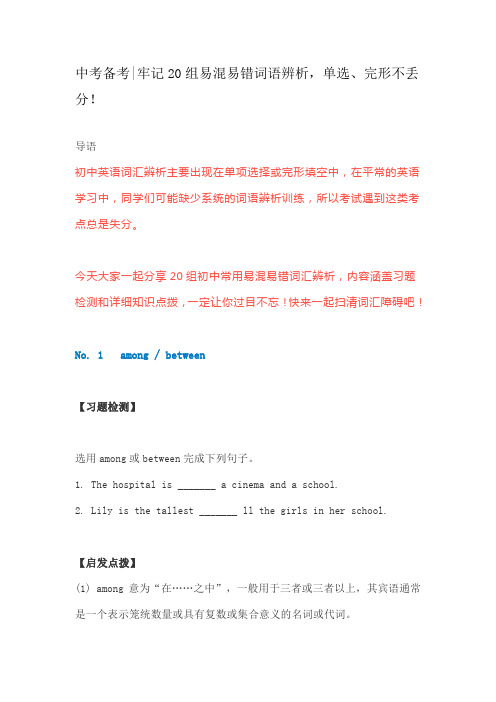
中考备考|牢记20组易混易错词语辨析,单选、完形不丢分!导语初中英语词汇辨析主要出现在单项选择或完形填空中,在平常的英语学习中,同学们可能缺少系统的词语辨析训练,所以考试遇到这类考点总是失分。
今天大家一起分享20组初中常用易混易错词汇辨析,内容涵盖习题检测和详细知识点拨,一定让你过目不忘!快来一起扫清词汇障碍吧!No. 1 among / between【习题检测】选用among或between完成下列句子。
1. The hospital is _______ a cinema and a school.2. Lily is the tallest _______ ll the girls in her school.【启发点拨】(1) among意为“在……之中”,一般用于三者或三者以上,其宾语通常是一个表示笼统数量或具有复数或集合意义的名词或代词。
(2) between一般指两者之间,其宾语通常是表示两者概念的名词或代词,或由and连接的两个具体的人或物。
between有时也可表示多者之中的“两两之间”。
如:Switzerland lies between France, Germany, Austria and Italy.Key:1. between2. amongNo. 2 lay / lie【习题检测】用lay或lie的适当形式完成句子。
1. I _______ the table when my mother cooked the meal.2. John was ill and _______ in bed all morning.【启发点拨】(1) lay作动词,可意为“摆放(餐桌)”,其过去式与过去分词均为laid,现在分词为laying,常用于短语lay the table,意为“摆放餐桌”。
如:Tom was laying the table.(2) lie作动词,意为“躺;平躺”时,过去式为lay,过去分词为lain,现在分词为lying。
易混词语的辨析
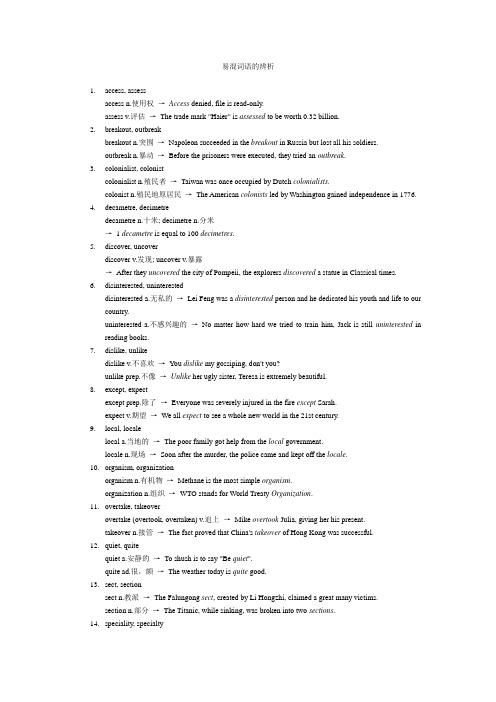
易混词语的辨析1.access, assessaccess n.使用权→Access denied, file is read-only.assess v.评估→The trade mark "Haier" is assessed to be worth 0.32 billion.2.breakout, outbreakbreakout n.突围→Napoleon succeeded in the breakout in Russia but lost all his soldiers.outbreak n.暴动→Before the prisoners were executed, they tried an outbreak.3.colonialist, colonistcolonialist n.殖民者→Taiwan was once occupied by Dutch colonialists.colonist n.殖民地原居民→The American colonists led by Washington gained independence in 1776.4.decametre, decimetredecametre n.十米; decimetre n.分米→ 1 decametre is equal to 100 decimetres.5.discover, uncoverdiscover v.发现; uncover v.暴露→After they uncovered the city of Pompeii, the explorers discovered a statue in Classical times.6.disinterested, uninteresteddisinterested a.无私的→Lei Feng was a disinterested person and he dedicated his youth and life to our country.uninterested a.不感兴趣的→No matter how hard we tried to train him, Jack is still uninterested in reading books.7.dislike, unlikedislike v.不喜欢→You dislike my gossiping, don't you?unlike prep.不像→Unlike her ugly sister, Teresa is extremely beautiful.8.except, expectexcept prep.除了→Everyone was severely injured in the fire except Sarah.expect v.期望→We all expect to see a whole new world in the 21st century.9.local, localelocal a.当地的→The poor family got help from the local government.locale n.现场→Soon after the murder, the police came and kept off the locale.anism, organizationorganism n.有机物→Methane is the most simple organism.organization n.组织→WTO stands for World Treaty Organization.11.overtake, takeoverovertake (overtook, overtaken) v.追上→Mike overtook Julia, giving her his present.takeover n.接管→The fact proved that China's takeover of Hong Kong was successful.12.quiet, quitequiet a.安静的→To shush is to say "Be quiet".quite ad.很,颇→The weather today is quite good.13.sect, sectionsect n.教派→The Falungong sect, created by Li Hongzhi, claimed a great many victims.section n.部分→The Titanic, while sinking, was broken into two sections.14.speciality, specialtyspeciality n.特性→Turning blue with iodine is the speciality of the starch.specialty n.特长,专长→His specialty at football led him to the national team.15.strike, strokestrike (struck, struck) v.打击,敲钟; stroke n.钟鸣声→The clock should have struck 6 but I heard 7 strokes.。
Units7-9易混词语辨析
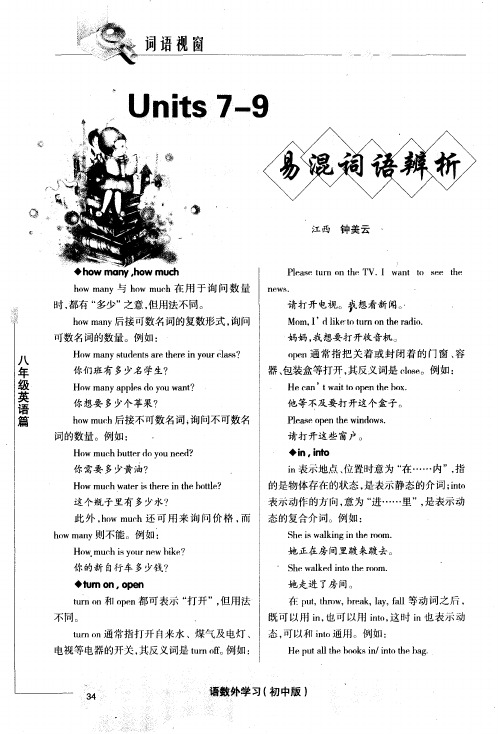
— —
8 Moh ri se p. u’d b t rn t . te sa le Yo et o e
妈 妈 , 想要 打 开收 音 机 。 我
o e 常指 把关 着 或封 闭着 的 门窗 、 pn通 容
器、 包装盒等打开 , 反义词是 c s。例如 : 其 le o
Hec l’ al twat1 p n teb x i oo e h o .
他等不及要 打开这个盒子。
P e s p n tewi d ws la eo e n o . h
t eTV . h
9 ~
— —
t elg t n a ac t nt efo r h ih ds w a h lo . a o
c) i it填空 。 用 n或 n o
1 . ihlv 0 Fs e i
一 一
t ewae . h tr t eca s h ls-
一
o a g sd r n e owen e o h aa e dfrtes ld?
你得到礼物 了吗?
码 re e. miki e ei ega s l t r t ls ? sh nh
5一 .
— —
Haf l.
B) tr 或 o e 用 uno n pn填空。
她 正在房 间里踱 来踱去。
S ewak di t h o . h l e n0tem m ’
她走进 了房 间。
在 ptt o , r k l ,a 等动 词之后 , u,h w be ,a fl r a y l
易混易错词语辨析
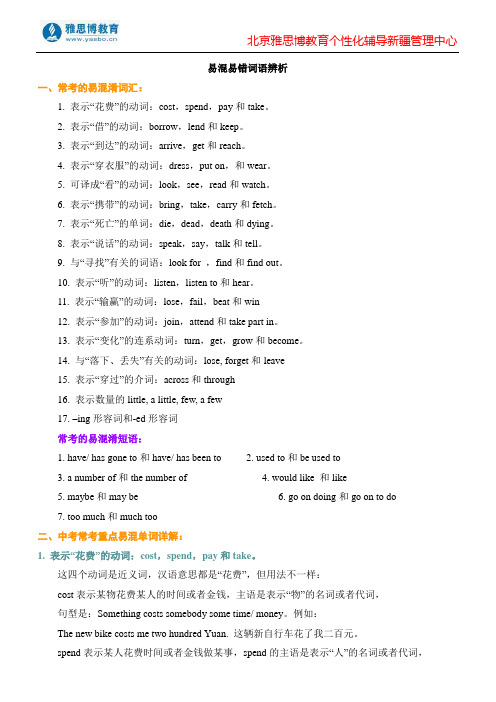
易混易错词语辨析一、常考的易混淆词汇:1. 表示―花费‖的动词:cost,spend,pay和take。
2. 表示―借‖的动词:borrow,lend和keep。
3. 表示―到达‖的动词:arrive,get和reach。
4. 表示―穿衣服‖的动词:dress,put on,和wear。
5. 可译成―看‖的动词:look,see,read和watch。
6. 表示―携带‖的动词:bring,take,carry和fetch。
7. 表示―死亡‖的单词:die,dead,death和dying。
8. 表示―说话‖的动词:speak,say,talk和tell。
9. 与―寻找‖有关的词语:look for ,find和find out。
10. 表示―听‖的动词:listen,listen to和hear。
11. 表示―输赢‖的动词:lose,fail,beat和win12. 表示―参加‖的动词:join,attend和take part in。
13. 表示―变化‖的连系动词:turn,get,grow和become。
14. 与―落下、丢失‖有关的动词:lose, forget和leave15. 表示―穿过‖的介词:across和through16. 表示数量的little, a little, few, a few17. –ing形容词和-ed形容词常考的易混淆短语:1. have/ has gone to和have/ has been to2. used to和be used to3. a number of和the number of4. would like 和like5. maybe和may be6. go on doing和go on to do7. too much和much too二、中考常考重点易混单词详解:1. 表示“花费”的动词:cost,spend,pay和take。
这四个动词是近义词,汉语意思都是―花费‖,但用法不一样:cost表示某物花费某人的时间或者金钱,主语是表示―物‖的名词或者代词,句型是:Something costs somebody some time/ money。
Modules 1-3 易混词语辨析
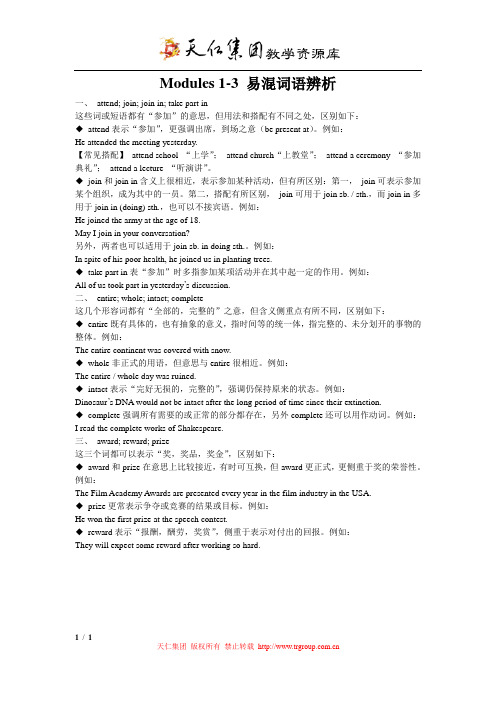
Modules 1-3 易混词语辨析一、attend; join; join in; take part in这些词或短语都有“参加”的意思,但用法和搭配有不同之处,区别如下:◆attend表示“参加”,更强调出席,到场之意(be present at)。
例如:He attended the meeting yesterday.【常见搭配】attend school “上学”;attend church“上教堂”;attend a ceremony “参加典礼”;attend a lecture “听演讲”。
◆join和join in含义上很相近,表示参加某种活动,但有所区别:第一,join可表示参加某个组织,成为其中的一员。
第二,搭配有所区别,join可用于join sb. / sth.,而join in多用于join in (doing) sth.,也可以不接宾语。
例如:He joined the army at the age of 18.May I join in your conversation?另外,两者也可以适用于join sb. in doing sth.。
例如:In spite of his poor health, he joined us in planting trees.◆take part in表“参加”时多指参加某项活动并在其中起一定的作用。
例如:All of us took part in yesterday’s discussion.二、entire; whole; intact; complete这几个形容词都有“全部的,完整的”之意,但含义侧重点有所不同,区别如下:◆entire既有具体的,也有抽象的意义,指时间等的统一体,指完整的、未分划开的事物的整体。
例如:The entire continent was covered with snow.◆whole非正式的用语,但意思与entire很相近。
(简单易混词)英语相似词语辨析ing

英语相似词语辨析第一刊第一部分1.a/an This is a banana.这是香蕉。
That's an apple.那是苹果。
<辨析> a 用在以辅音音素开头的词前,an 用在以元音音素开头的词前。
这里所说的是音素,而不是字母。
注意:1) 书写以辅音字母开头,发音以元音音素开头的单词前面用an .如:an hour 一小时;an honest girl 一个诚实的女孩.辅音字母f,h,l,m,n,r,s,x 单独使用时因它们的发音都分别以元音开头其前面用an 。
如:an"l",一个"l"。
2)书写以元音字母开头发音以辅音音素开头的单词前面用 a 。
如:a useful bood 一本有用的书。
2.a/oneThere is a glass on the table.桌上有只玻璃杯。
There is one glass on the table.桌上有一只玻璃杯。
<辨析> 不定冠词a 和数词one 都可以修饰单数可数名词,表示“一”或“一个”。
a 着重指类别,表示同类事物中的任何一个,有泛指的意义,不一定要译出。
one着重指数量,是与two,three等数词相对而言的。
试比较:I have a pen.(意即我有的是笔,不是其它什么东西。
)I have one pen.(意即我有一枝笔,不是两枝,三枝。
)a 和one 还有如下异同:1)表示“每一”含义时,用a 不用one 。
如:We have five English classes a week.我们每周上五节英语课。
I drink tea three times a day.我一天喝三次茶。
2)表示编号时,用one 不用a 。
如:Are you in Grade One? 你在一年级吗?3)在“一”和其它数量词接连出现时,两者可互换,但表示强调对比时,用one 不用a 。
辨析英语易混词语
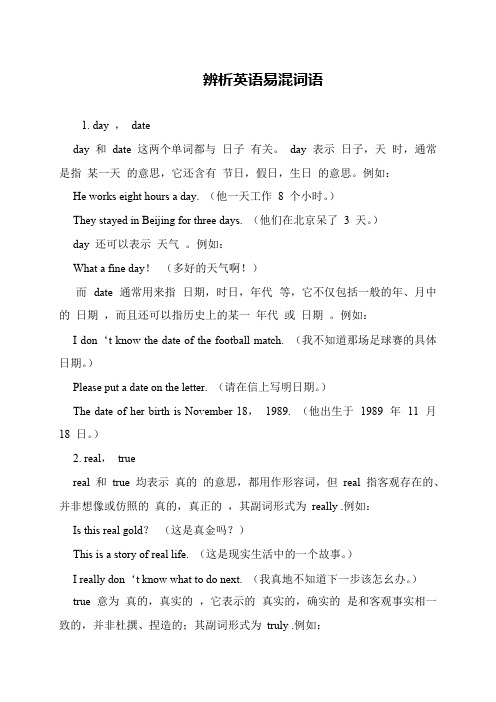
辨析英语易混词语1. day ,date day 和date 这两个单词都与日子有关。
day 表示日子,天时,通常是指某一天的意思,它还含有节日,假日,生日的意思。
例如: He works eight hours a day. (他一天工作8 个小时。
) They stayed in Beijing for three days. (他们在北京呆了3 天。
) day 还可以表示天气。
例如: What a fine day!(多好的天气啊!) 而date 通常用来指日期,时日,年代等,它不仅包括一般的年、月中的日期,而且还可以指历史上的某一年代或日期。
例如: I don‘t know the date of the football match. (我不知道那场足球赛的具体日期。
) Please put a date on the letter. (请在信上写明日期。
) The date of her birth is November 18,1989. (他出生于1989 年11 月18 日。
) 2. real,true real 和true 均表示真的的意思,都用作形容词,但real 指客观存在的、并非想像或仿照的真的,真正的,其副词形式为really .例如: Is this real gold?(这是真金吗?) This is a story of real life. (这是现实生活中的一个故事。
) I really don‘t know what to do next. (我真地不知道下一步该怎幺办。
) true 意为真的,真实的,它表示的真实的,确实的是和客观事实相一致的,并非杜撰、捏造的;其副词形式为truly .例如:。
中考英语之易混淆词汇知识点辨析
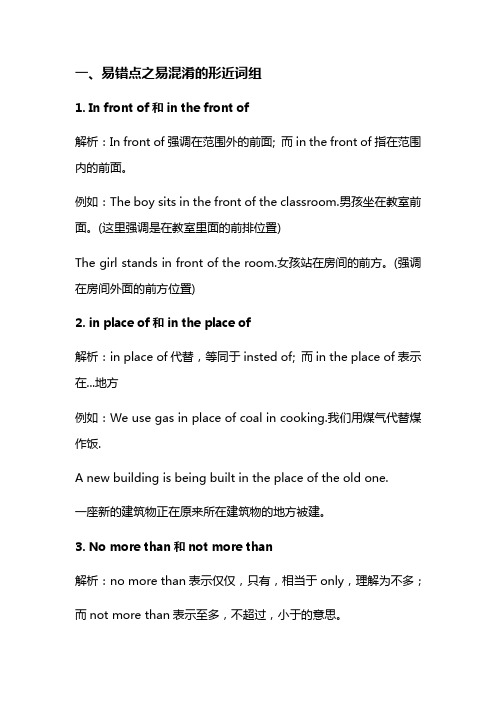
一、易错点之易混淆的形近词组1.In front of和in the front of解析:In front of强调在范围外的前面; 而in the front of指在范围内的前面。
例如:The boy sits in the front of the classroom.男孩坐在教室前面。
(这里强调是在教室里面的前排位置)The girl stands in front of the room.女孩站在房间的前方。
(强调在房间外面的前方位置)2.in place of和in the place of解析:in place of代替,等同于insted of; 而in the place of表示在...地方例如:We use gas in place of coal in cooking.我们用煤气代替煤作饭.A new building is being built in the place of the old one.一座新的建筑物正在原来所在建筑物的地方被建。
3.No more than和not more than解析:no more than表示仅仅,只有,相当于only,理解为不多;而not more than表示至多,不超过,小于的意思。
例如:He is no more than an ordinary English teacher. 他只不过是个普通的英文老师。
He has not more than three children. 他最多3 个孩子(有或许还不到三个)4.On earth和on the earth解析:两者都有在地上,在地球上的意思,但on earth还有到底,究竟的意思;On the earth只是单纯的表示在地上,在地球上例如:where on earth did you spring from?你究竟从哪里冒出来的?What if there was no lead on the earth at all?如果地球上根本就没有铅这种物质怎么办?5.At all和after all解析:at all表示根本,全然的意思,常用短语not at all表示一点也不;after all表示到底,毕竟的意思例如:I don't know him at all. 我根本不认识他。
2019年英语翻译资格(水平)考试英语易混词语辨析(二)
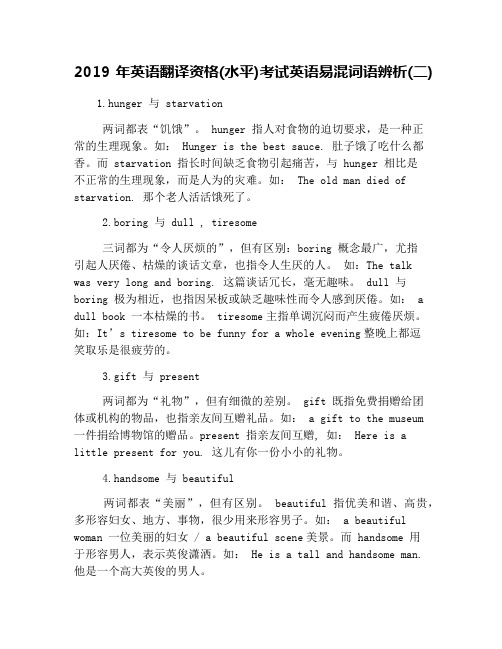
2019年英语翻译资格(水平)考试英语易混词语辨析(二)1.hunger 与 starvation两词都表“饥饿”。
hunger 指人对食物的迫切要求,是一种正常的生理现象。
如: Hunger is the best sauce. 肚子饿了吃什么都香。
而 starvation 指长时间缺乏食物引起痛苦,与 hunger 相比是不正常的生理现象,而是人为的灾难。
如: The old man died of starvation. 那个老人活活饿死了。
2.boring 与 dull , tiresome三词都为“令人厌烦的”,但有区别:boring 概念最广,尤指引起人厌倦、枯燥的谈话文章,也指令人生厌的人。
如:The talk was very long and boring. 这篇谈话冗长,毫无趣味。
dull 与boring 极为相近,也指因呆板或缺乏趣味性而令人感到厌倦。
如: a dull book 一本枯燥的书。
tiresome主指单调沉闷而产生疲倦厌烦。
如:It’s tiresome to be funny for a w hole evening整晚上都逗笑取乐是很疲劳的。
3.gift 与 present两词都为“礼物”,但有细微的差别。
gift 既指免费捐赠给团体或机构的物品,也指亲友间互赠礼品。
如: a gift to the museum一件捐给博物馆的赠品。
present 指亲友间互赠, 如: Here is alittle present for you. 这儿有你一份小小的礼物。
4.handsome 与 beautiful两词都表“美丽”,但有区别。
beautiful 指优美和谐、高贵,多形容妇女、地方、事物,很少用来形容男子。
如: a beautiful woman 一位美丽的妇女 / a beautiful scene美景。
而 handsome 用于形容男人,表示英俊潇洒。
易混词语辨析
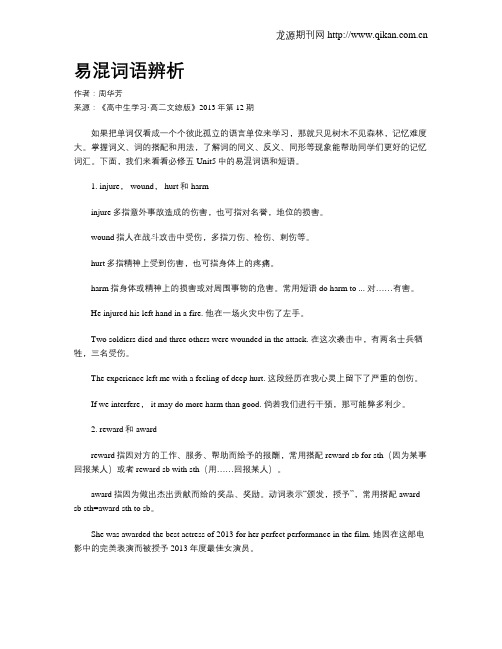
易混词语辨析作者:周华芳来源:《高中生学习·高二文综版》2013年第12期如果把单词仅看成一个个彼此孤立的语言单位来学习,那就只见树木不见森林,记忆难度大。
掌握词义、词的搭配和用法,了解词的同义、反义、同形等现象能帮助同学们更好的记忆词汇。
下面,我们来看看必修五Unit5中的易混词语和短语。
1. injure, wound, hurt和harminjure多指意外事故造成的伤害,也可指对名誉,地位的损害。
wound指人在战斗攻击中受伤,多指刀伤、枪伤、刺伤等。
hurt多指精神上受到伤害,也可指身体上的疼痛。
harm指身体或精神上的损害或对周围事物的危害。
常用短语do harm to ... 对……有害。
He injured his left hand in a fire. 他在一场火灾中伤了左手。
Two soldiers died and three others were wounded in the attack. 在这次袭击中,有两名士兵牺牲,三名受伤。
The experience left me with a feeling of deep hurt. 这段经历在我心灵上留下了严重的创伤。
If we interfere, it may do more harm than good. 倘若我们进行干预,那可能弊多利少。
2. reward和awardreward指因对方的工作、服务、帮助而给予的报酬,常用搭配reward sb for sth(因为某事回报某人)或者reward sb with sth(用……回报某人)。
award指因为做出杰出贡献而给的奖品、奖励。
动词表示“颁发,授予”,常用搭配award sb sth=award sth to sb。
She was awarded the best actress of 2013 for her perfect performance in the film. 她因在这部电影中的完美表演而被授予2013年度最佳女演员。
高中英语易混易错词汇辨析100组
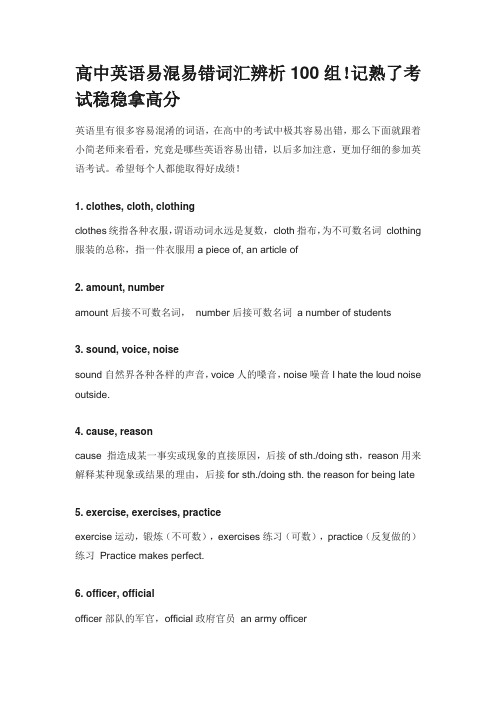
高中英语易混易错词汇辨析100组!记熟了考试稳稳拿高分英语里有很多容易混淆的词语,在高中的考试中极其容易出错,那么下面就跟着小简老师来看看,究竟是哪些英语容易出错,以后多加注意,更加仔细的参加英语考试。
希望每个人都能取得好成绩!1. clothes, cloth, clothingclothes统指各种衣服,谓语动词永远是复数,cloth指布,为不可数名词clothing 服装的总称,指一件衣服用a piece of, an article of2. amount, numberamount后接不可数名词,number后接可数名词a number of students3. sound, voice, noisesound自然界各种各样的声音,voice人的嗓音,noise噪音I hate the loud noise outside.4. cause, reasoncause 指造成某一事实或现象的直接原因,后接of sth./doing sth,reason用来解释某种现象或结果的理由,后接for sth./doing sth. the reason for being late5. exercise, exercises, practiceexercise运动,锻炼(不可数),exercises练习(可数),practice(反复做的)练习Practice makes perfect.6. officer, officialofficer部队的军官,official政府官员an army officer7. work, job二者均指工作。
work不可数,job可数 a good job8. cook, cookercook厨师,cooker厨具He is a good cook.9. problem, questionproblem常和困难连系,前面的动词常为think about, solve, raise,question常和疑问连系,多和ask, answer连用10. a number of, the number ofa number of许多,谓语动词用复数。
八年级第二单元易混词语辨析
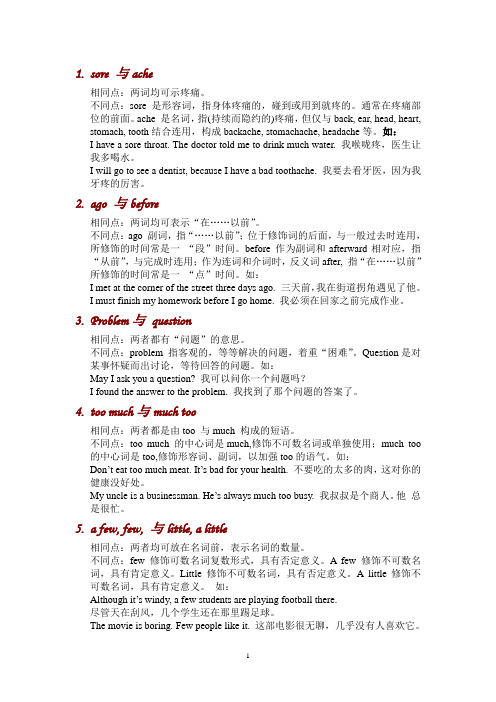
1.sore 与ache相同点:两词均可示疼痛。
不同点:sore 是形容词,指身体疼痛的,碰到或用到就疼的。
通常在疼痛部位的前面。
ache 是名词,指(持续而隐约的)疼痛,但仅与back, ear, head, heart, stomach, tooth结合连用,构成backache, stomachache, headache等。
如:I have a sore throat. The doctor told me to drink much water. 我喉咙疼,医生让我多喝水。
I will go to see a dentist, because I have a bad toothache. 我要去看牙医,因为我牙疼的厉害。
2.ago 与before相同点:两词均可表示“在……以前”。
不同点:ago 副词,指“……以前”;位于修饰词的后面,与一般过去时连用,所修饰的时间常是一“段”时间。
before 作为副词和afterward相对应,指“从前”,与完成时连用;作为连词和介词时,反义词after, 指“在……以前”所修饰的时间常是一“点”时间。
如:I met at the corner of the street three days ago. 三天前,我在街道拐角遇见了他。
I must finish my homework before I go home. 我必须在回家之前完成作业。
3.Problem与question相同点:两者都有“问题”的意思。
不同点:problem 指客观的,等等解决的问题,着重“困难”。
Question是对某事怀疑而出讨论,等待回答的问题。
如:May I ask you a question? 我可以问你一个问题吗?I found the answer to the problem. 我找到了那个问题的答案了。
4.too much与much too相同点:两者都是由too 与much 构成的短语。
Units4-6易混词语辨析
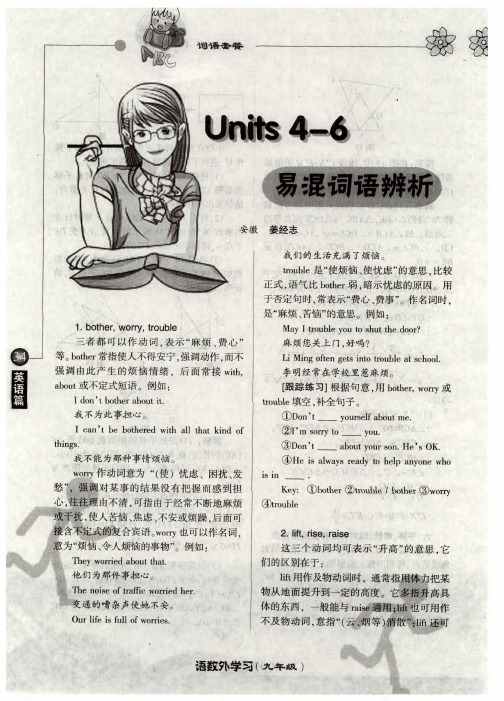
(~)t r o u b l e
j0 j≯
+
。
_j
i 虢 镧寺
“
使 人 苦恼 焦 虑 不 安或烦 躁 后 面 可
、 、
,
_鼢 术定躺 复合 宾 语 o r r y 也 可 以 作 名 词 例如 0 豫 为 烦恼 令 人 烦 恼 的事 物
。
W
,
2
.
1if t
,
r is e
,
r a is e
“
”
.
”
、
0
u r
l if e i S f u l l
o
f
W Or r
ie
s
.
语 数外 学 习 (
黯黪
用 作 名词 意 为 电梯
“
,
”
。
例如 :
u r
Ple
a s e
t lif l
。
r a
is
e
yo
ha
n
d
.
请举手
We
o
t f
e n
l if t
w a
te
2 1:
r
fr o
m
th e
。
w e
H
.
我 们 经 常从 这
The
w a
。
te
r
o
f t h
。
e
i r
v e r
is r i
s
in g
.
河 水在上 涨
In tho
s e
c o u n
tr
ie
s
i pr
c e s
i r
Units10-12易混词语辨析
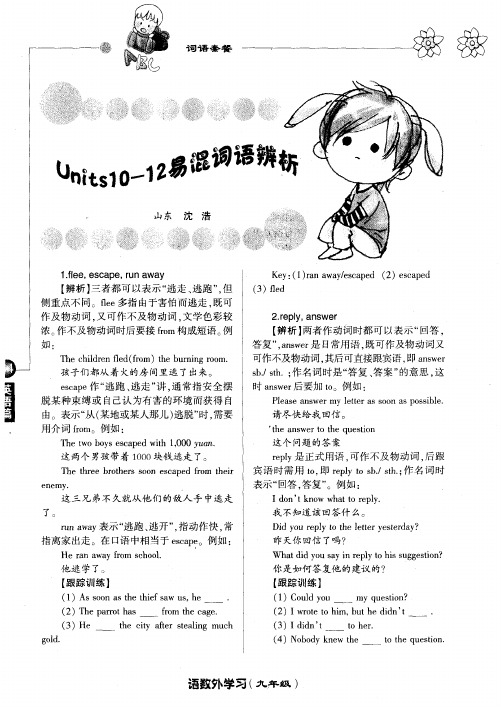
语数外学习 ( 九年 级 )
K y ( ) nw r( ) el as e e :1 as e 2 rpy nw r /
( ) el 4 nw r 3 rpy()as e
3 S a , o . a , u h . a . 0 t t s t t s c .h t h h . t
【 辨析l a 用作连词短语不可分开, stt oh 意
如:
Th b y i O y u g h t h a t g o e o s S o n t a e c n’ o t
s h o. Th o sto y u g t o t c o 1 c o 1= e b y i o o n og o s h o.
He r n a y fo s h o . a wa r m c o 1
昨 天 你 回 信 了吗 ?
W ha i o a n r pyt ss g e to ? t d y u s y i e l ohi u g sin d
他逃 学 了。
你是如何答复他 的建议 的?
Id n’ n w a o r py o tk o wh tt e l .
这 三兄 弟不久就从他 们 的敌 人手 中逃走
了。
我不知道 该回答什 么。
Di o e l o te lt ry se d y d y u r py t h et e tr a ? e
lna a 表示 “ l w y l 逃跑 、 逃开 ”指 动作快 , , 常 指离家 出走 。在 E语 中相 当于 ecp 。例如 : l sae
为“ 以便 , 的是” 引 导 目的状 语从 句和结 果 为 , 状语从句 。例如 :
I o p v r e ry td y S ta I c ud g tu e y a l o a O h t o l
- 1、下载文档前请自行甄别文档内容的完整性,平台不提供额外的编辑、内容补充、找答案等附加服务。
- 2、"仅部分预览"的文档,不可在线预览部分如存在完整性等问题,可反馈申请退款(可完整预览的文档不适用该条件!)。
- 3、如文档侵犯您的权益,请联系客服反馈,我们会尽快为您处理(人工客服工作时间:9:00-18:30)。
英语易混词语辨析
1.some一般用于肯定的陈述句中,any多用于否认句、疑问句或条件句中。
两者都可修饰可数名词,也可修饰不可数名词。
例如:There is some water in the cup.
Do you have any friends in Shanghai?
If you have any help, let me know.
2.在疑问句中有时也用some,表示希望得到肯定的答复或表示请求、建议、命令等含义。
例如:Would you like some more tea?
3.any也可以用在肯定陈述句中或条件状语从句中,表示任何的、任何一个的,其后接名词单数形式。
例如:Jim runs faster than any other student in his class.
1.few, a few修饰可数名词复数形式,little, a little 修饰不可数名词。
2.a few,a little有肯定含义,译作有几个,有一点;而few 和little表否认,译作没有几个,没有多少。
many, much和a lot of/lots of
都是许多的意思,many后接可数名词复数形式,much后接不可数名词,a lot of/lots of后接可数名词复数形式或不可数名词都可以。
each对两个或两个以上的人或物而言,侧重于个体,且可单独作主语、宾语等;every是对三个或三个以上的人或事物而言,侧重整体情况,且不能单独使用,只能做修饰词。
